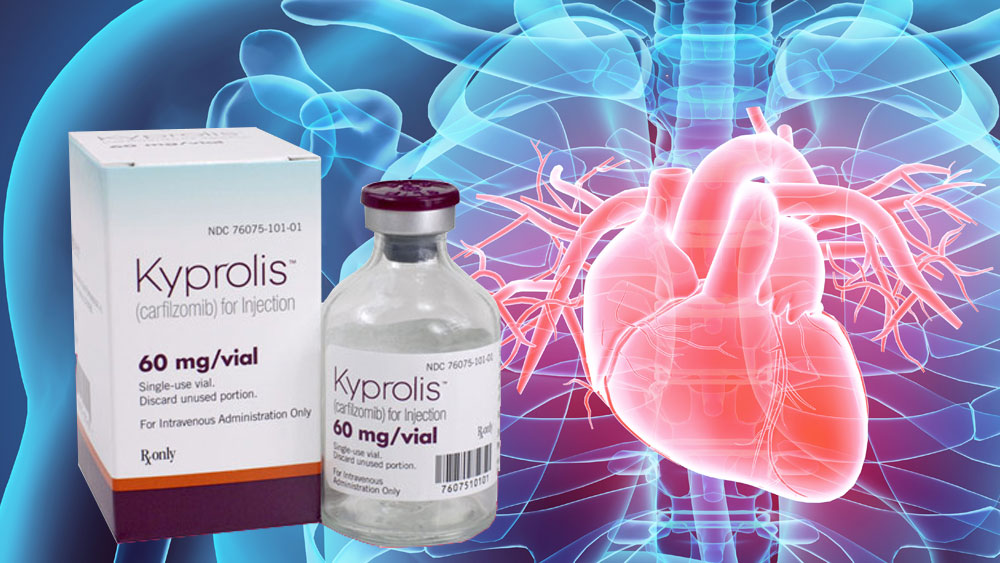Carfilzomib cardiovascular risk has been well documented.
Carfilzomib-based regimens have produced clinically meaningful benefits, including significant improvement in the depth and duration of responses in RRMM patients. Studies have shown the superiority in overall survival (OS) data of Kd vs Vd and KRd vs Rd, with a nearly 8-month increase in median OS in patients treated with carfilzomib. Carfilzomib-based regimens have been generally well tolerated.
The evidence and concern for carfilzomib-based combination therapy and cardiovascular risks is well established in multiple myeloma. However, in a recent study published in in Blood Advances, the clinical benefits, which includes an improved overall survival (OS) outcome, outweigh the risk of hypertension and cardiac failure for patients with relapsed and/or refractory multiple myeloma (RRMM).
Studies have shown that carfilzomib significantly improves outcomes in RRMM, but may also increase the risk of cardiovascular (CV) disease. Various factors contribute to elevated CV risk among patients with MM, such as age, renal failure, hyperviscosity, and treatment-associated cardiotoxicity. As carfilzomib is further becoming a key component of myeloma combination backbone therapy, it necessitates an improved understanding of its relationship with CV risk.
This evaluation included analysis of 11 phase I through III carfilzomib-based combination clinical trials. Importantly involving the randomized phase 3 ASPIRE and ENDEAVOR trials, which investigated the efficacy of carfilzomib among 2044 patients with RRMM. The overall safety profile, which included the incidence of CV adverse events (AEs) was investigated. In addition, a benefit-risk profile for carfilzomib was generated. The cardiac AEs of interest included in this study were cardiac failure, hypertension, dyspnea, and ischemic heart disease. All patients who received ≥1 dose of study treatment were included in the safety analysis.
The results demonstrated the most commonly reported carfilzomib cardiovascular risks (AEs) were cardiac failure, hypertension, and dyspnea, with any-grade incidences of 6.7%, 18.5%, and 31.9%, respectively, and grade ≥3 incidences of 4.4%, 5.9%, and 4.5%, respectively. Although there was an elevated risk of CV adverse events, further analysis showed that the rate of treatment discontinuation or death was low and comparable between the carfilzomib-based combination groups and the control groups.
Evaluation of the possible effects of carfilzomib on cardiac function by concentration-QTc analysis in cancer patients, including MM, revealed that carfilzomib had no clinically significant impact. Echocardiography revealed that carfilzomib did not increase cardiac dysfunction compared with the control arms, and also had no effect on cardiac repolarization.
The authors concluded that although cardiac AEs are numerically higher among carfilzomib-treated patients, the relative carfilzomib cardiovascular risk of remains relatively low and rarely leads to dose reductions or treatment discontinuation. Moreover, the consequences are generally manageable, with no higher risk for fatal outcomes. “The results suggest that the benefit of carfilzomib treatment in reducing disease progression, and even death, outweighs CV risks for most patients. Nonetheless, careful monitoring and management of CV risk factors, including blood pressure and volume status, are recommended for all myeloma patients as good clinical practice.”
Related Articles
FDA Approves Addition of Positive OS Data from Phase 3 ASPIRE Trial to Carfilzomib Label
New Data in Relapsed and Refractory Multiple Myeloma
Reference
Chari A, Stewart AK, Russell SD, et al. Analysis of carfilzomib cardiovascular safety profile across relapsed and/or refractory multiple myeloma clinical trials [published July 10, 2018]. Blood Adv. doi: 10.1182/bloodadvances.2017015545

